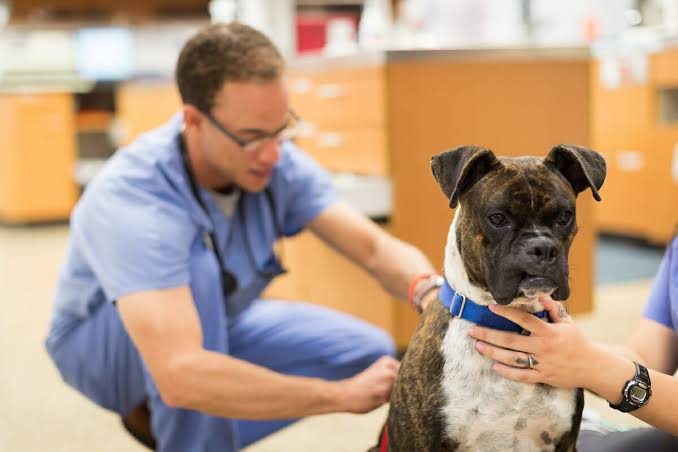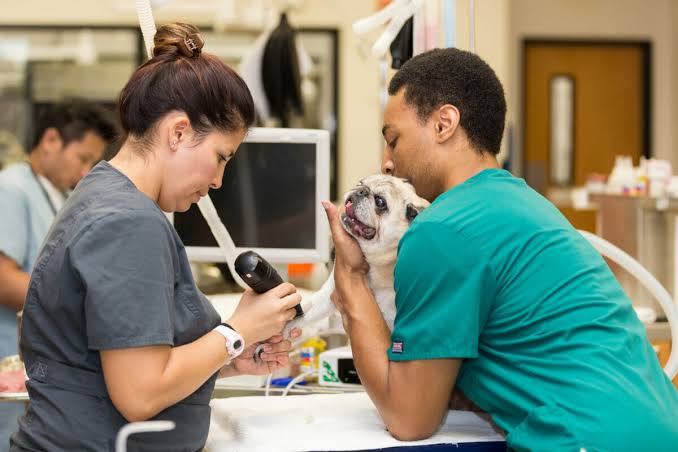
Veterinarians, or vets, are animal doctors who take care of pets, farm animals, wildlife, and more. In this guide, we’ll learn about what vets do, how they become vets, where they work, and why their work is important for animals and people.
Exploring US Veterinary Universities
Before diving into the application process, it’s crucial to research and identify veterinary universities in the United States that align with your career goals and interests.

Consider factors such as accreditation, faculty expertise, research opportunities, clinical experiences, and geographic location when selecting potential universities.
Researching Veterinary Universities
Veterinarians, commonly known as vets, play a crucial role in safeguarding the health and well-being of animals. Here are some facts about veterinarians that shed light on their profession:
1. Educational Pathway
- Veterinarians undergo extensive education and training. They typically complete a Doctor of Veterinary Medicine (DVM) degree program, which involves four years of veterinary school after completing a bachelor’s degree.
- Admission to veterinary school is highly competitive, with applicants needing a strong academic background in sciences and relevant experience in the field.
2. Versatile Practice Areas
- Vets work in diverse practice areas, including companion animal care (such as dogs and cats), livestock management (cattle, poultry, etc.), exotic animal medicine (birds, reptiles, etc.), wildlife conservation, public health, research, and academia.
- Some veterinarians specialize in areas like surgery, dentistry, dermatology, internal medicine, oncology, behavior, and emergency medicine.
3. Animal Health Advocates
- Veterinarians are advocates for animal health and welfare. They diagnose and treat illnesses and injuries, perform surgeries, administer vaccinations, conduct preventive care, and educate pet owners on proper animal care.
- Vets also play a vital role in public health by monitoring and controlling diseases that can be transmitted from animals to humans (zoonotic diseases).
4. Work Environments
- Vets work in various settings, including private clinics, animal hospitals, research laboratories, government agencies (such as the USDA or FDA), zoos, aquariums, wildlife sanctuaries, and academia.
- The nature of their work can involve long hours, on-call duties for emergencies, and sometimes physically demanding tasks, especially in large animal practice.
5. Continuing Education and Licensing
- After completing veterinary school, veterinarians must obtain a license to practice in their state or country. This typically involves passing a national licensing examination.
- Vets are required to participate in continuing education to stay updated on advancements in veterinary medicine, new treatments, and regulatory changes.
6. Impact on Human Health
- Veterinarians contribute to human health through disease surveillance in animals, research on zoonotic diseases, food safety inspections, and collaboration with public health agencies during disease outbreaks.
7. Global Perspective
- The field of veterinary medicine is global, with veterinarians working worldwide to address animal health issues, promote sustainable agriculture, protect endangered species, and ensure the humane treatment of animals.
In summary, veterinarians are highly skilled professionals dedicated to promoting animal health, advancing medical science, safeguarding public health, and advocating for the welfare of animals across various species and environments. Their work is essential for maintaining the health and balance of ecosystems and the well-being of both animals and humans.
The American Veterinary Medical Association (AVMA) accredits veterinary programs in the US. You can find a list of Veterinary Schools in the US on their website.
Application Requirements
Each veterinary university may have specific requirements for admission. However, common application components include:
1. Academic Prerequisites
Veterinary schools typically require a bachelor’s degree or equivalent coursework in biological sciences, chemistry, physics, and mathematics. They also have minimum GPA requirements, usually around 3.0 or higher.
2. Veterinary Experience
Applicants are expected to have veterinary shadowing or work experience to demonstrate their commitment to the field. Letters of recommendation from veterinarians or supervisors are often required.
3. Standardized Tests
Most veterinary schools require Graduate Record Examination (GRE) scores. Some universities may also require additional tests like the Veterinary College Admission Test (VCAT).
4. Personal Statement
A compelling statement of purpose or essay highlighting your passion for veterinary medicine, relevant experiences, and career goals is essential.
5. Letters of Recommendation
Letters from professors, veterinarians, or employers who can attest to your academic abilities, work ethic, and suitability for veterinary school are crucial.
6. Additional Requirements
Some universities may require interviews or supplemental application materials. International students may need to fulfill language proficiency requirements (e.g., TOEFL or IELTS scores).
Application Procedures
Once you have identified the veterinary universities you wish to apply to, follow these general steps for the application process:
1. Research Deadlines
Review application deadlines for each university. Some schools have rolling admissions, while others have specific application periods.
2. Create an Application Account
Visit the admissions portal or website of each university to create an application account.
3. Submit Transcripts and Test Scores
Request official transcripts from all colleges or universities attended. Submit GRE scores and any additional required test scores.
4. Complete Application Forms
Fill out the online application forms, providing accurate and detailed information. Upload required documents, such as your personal statement and letters of recommendation.
5. Pay Application Fees
Pay the application fees for each university. Some schools offer fee waivers for eligible applicants.
6. Monitor Application Status
Check your application status regularly through the university’s online portal. Follow up on any missing documents or requirements.
7. Prepare for Interviews (if required)
If selected for interviews, prepare by researching the university, practicing common interview questions, and showcasing your passion for veterinary medicine.
Tips for a Successful Application
- Start the application process early to meet deadlines and avoid last-minute stress.
- Tailor your personal statement and application materials to each university.
- Highlight relevant experiences, skills, and achievements that demonstrate your readiness for veterinary school.
- Seek feedback on your application materials from mentors, advisors, or writing centers.
- Be proactive and responsive during the application process, addressing any requests or inquiries promptly.
Frequently Asked Questions (FAQ)
Q: Can I apply to multiple veterinary universities?
A: Yes, you can apply to multiple veterinary universities to increase your chances of acceptance. However, be mindful of application deadlines and requirements for each school.
Q: Are there specific GPA or GRE score requirements for veterinary school?
A: Each university sets its GPA and GRE score requirements. Aim to meet or exceed the minimum requirements to strengthen your application.
Q: What types of veterinary experience are preferred?
A: Veterinary experience can include shadowing veterinarians, volunteering at animal clinics or shelters, and working in animal-related roles. Diverse experiences showcase your commitment to veterinary medicine.
Q: How can I improve my application if my GPA or test scores are below average?
A: Focus on highlighting strengths in other areas of your application, such as veterinary experience, letters of recommendation, and personal statement. Consider retaking exams or pursuing additional coursework to demonstrate academic readiness.
Q: Are there scholarships or financial aid options for veterinary students?
A: Many veterinary universities offer scholarships, grants, and financial aid packages. Research and apply for scholarships early to explore funding opportunities.
Embark on your journey to veterinary school with confidence, thorough preparation, and a compelling application that showcases your passion for veterinary medicine and readiness for academic and clinical challenges. Best of luck with your application!


